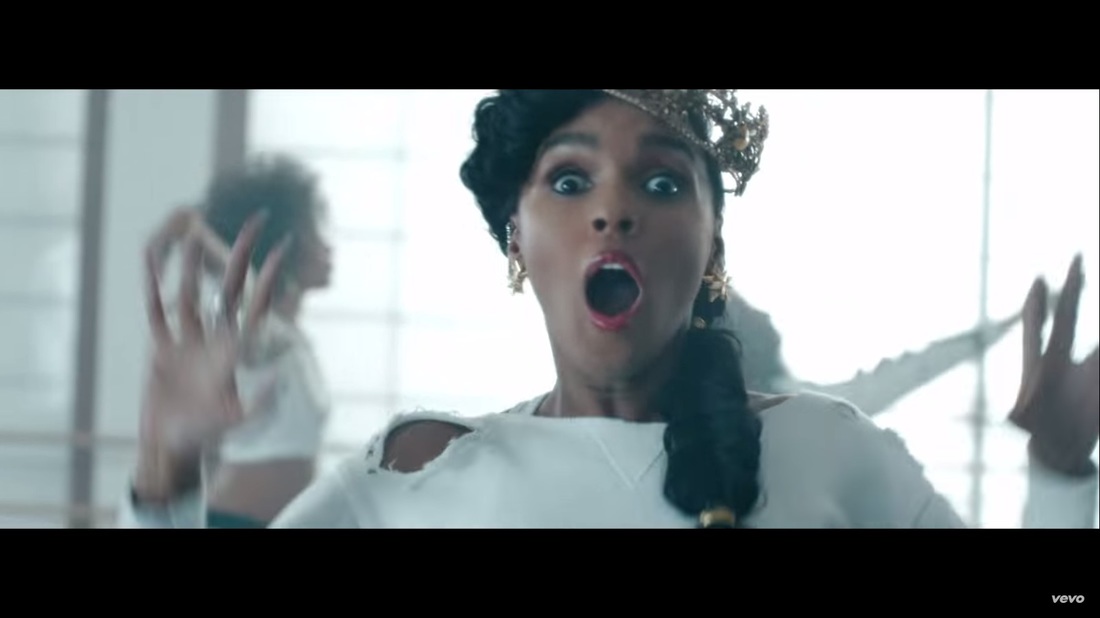But Janelle Monáe reminds me that in addition to all of the things I express through my body, like my awkward attempts at asanas, the occasional yoga breakthrough (like that one time I did full-on wheel pose ALL MY MYSELF in my living room), and my commitment to groundedness, my body is also a sexual body, even while doing yoga. I know, I know, Janelle is singing about getting down at the club, but there’s something about the song that gets me thinking about how yoga has helped me to be more comfortable in my body, especially since experiencing sexual assault. It has helped me to be more confident, healthy, and self-aware, more focused on my body’s (physical, emotional, and sexual) needs, and more flexible (mentally as well as physically). It hasn’t drastically changed my physical appearance, but I have certainly developed more of an existence of being in myself, if that makes any sense. Yep, yoga has been life-changing for me.
So, back to the song. If you haven’t heard it, you must. It’s super catchy and fun and sexy and even better because it’s written by a six-time Grammy nominee on her own record label. The video is great because I can dance along to the chorus (seriously—the moves are super follow-able for us the common folk who wish we could dance and actually feel like we can kind of dance with moves like this) and feel all empowered while I do it with lines like: “I ain’t got no worries, I’m my own private dancer” and “Crown on my head but the world on my shoulder / I’m too much a rebel, never do what I’m supposed ta.” Not to mention that I love how Janelle takes yoga out of the context of studios filled with upper white class women and owns it by her own terms.
And then there’s the last part of the second verse: “You cannot police me so get off my areola, get off my areola.”
It’s a reminder about how women’s bodies are still objectified, commodified, trivialized, and controlled. It makes it seem ironic, then, that “areola” was censor-worthy when Janelle performed “Yoga” on The Tonight Show back in May. If you listen closely, she actually sings something that sounds like “little ola.” The performance is still great, but come on. I didn’t even know “areola” was considered profane, let alone not suitable for late-night programming. Still, Janelle reminds us that “Sometimes I’m peachy, and sometimes I’m vulgar / Even when I’m sleeping I got one eye open.” She may have self-censored, but she’s aware of it and she will find other ways to express resistance. At least this is what I like to think about her performance.
At any rate, I’m still in love with the song and the way Janelle creates space for bodily agency and empowerment. Though some arguments can be made for “Yoga” catering somewhat to a hetero male audience—and such points made stronger by some of Jidenna’s lyrics—Janelle has made it clear in the past that she’s a feminist and that she is “not for male consumption.” In a culture in which we are still struggling against slut-shaming, abstinence-only education, rampant sexual violence, and victim-blaming, “Yoga” offers an affirming path for self-loving sexuality.
I think the key, as Janelle models, is to not take ourselves too seriously. Some of my favorite yoga instructors offer the same mantra: work hard, but do it with a sense of humor. This kind of feminist resistance is fierce and focused, but invitational. Feminism, like yoga, should be flexible and self-aware and strong, but it can also be fun, sexy, humble, and willing to laugh at itself. And if this is the kind of feminism we engage in, maybe more folks will join us. After all, no one wants to join a yoga class full of uppity snobs only concerned with appearances and showing off. Let’s flex our humor-filled feminist muscles with Janelle. We might even achieve a kind of feminist nirvana.




 RSS Feed
RSS Feed